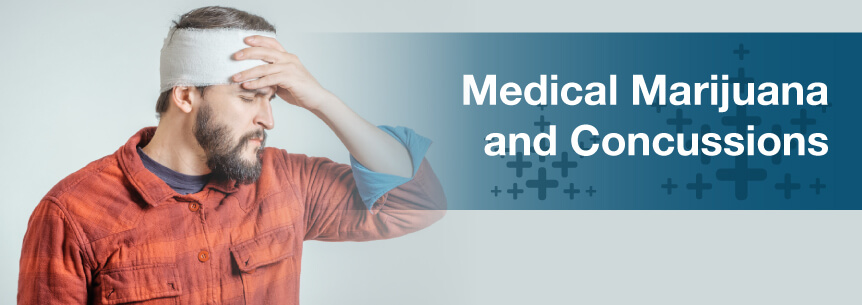
While not fatal themselves, concussions can have serious short-term and long-lasting repercussions. They frequently occur in sports, but they may happen after any blow or jolt to the head — even if there are no visible injuries. Taking steps to prevent this type of injury, which involves proper education of coaches, teachers, trainers, parents and the athletes themselves — at a minimum, is the best concussion management protocol.
The American Association of Neurological Surgeons (AMNS) describes concussions as brain injuries resulting in temporary losses of normal brain function. Blows to the head cause most concussions, and there are often no external signs of head trauma with this type of injury. That’s why experts sometimes refer to them as invisible injuries.
While many people believe concussions result in loss of consciousness, this isn’t necessarily the case. Many people who have concussions don’t lose consciousness.
Some of the effects of a concussion include loss of:
Concussions are common in many sports. The University of Pittsburgh Neurological Surgery Center estimates athletes in contact sports have a 19 percent likelihood of experiencing a concussion per season.
Because of this likelihood, most sports have adopted concussion protocols for players following injuries to the head. In the majority of cases, concussion management consists mainly of requiring the patient to rest and restricting them from physical activity. In some cases, physicians advise concussion patients to limit their cognitive activity as well. Players must complete the protocols, signaling good physical and mental clarity before returning to the game or having a “return to play (RTP)” or “return to learn (RTL)” status.
Concussions have a vast list of symptoms and can lead to long-term consequences. Symptoms range from the physical (body) to the emotional (feelings) and cognitive (mind). Understanding the signs and symptoms of a concussion ensures people who exhibit the following symptoms receive prompt medical attention — even if the symptoms do not appear until days after the injury occurs:
If you or someone you know experiences symptoms like these following a blow or jolt to the head, evaluation for a concussion should happen right away. That said, in some cases, an athlete doesn’t even realize they have suffered a concussion, as the symptoms are subtle.
Symptoms of a concussion may interfere with your ability to function and perform at work or in school. People who suffer from three or more concussions develop depression at a rate three times greater than the general population.
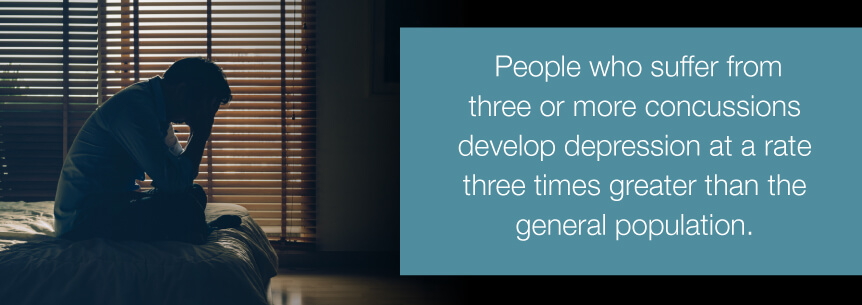
Mayo Clinic suggests children who have concussions may experience the typical symptoms mentioned above. Children with concussions may also have additional symptoms, such as:
Concussion symptoms may persist for weeks or even months after the initial injury occurred if you develop a condition known as post-concussion syndrome. If you’ve had previous concussions, you have a greater risk of developing PCS.
Concussions occur when the brain impacts with the inner walls of your skull. A variety of injuries may cause this to happen, including the following:
While all contact sports and recreational activity pose some risk for concussion, three sports have higher risks of concussion, according to the American Academy of Orthopaedic Surgeons. These include:
If you play these sports or are parents or coaches of children who play these sports, it’s especially imperative to recognize the signs and symptoms of concussion and discuss them with your children if applicable.
Other activities may increase the risk of concussion too, including:
Wearing proper safety gear when possible reduces concussion risks but does not eliminate them.
Physicians grade concussions based on a variety of factors and categorize them into three main types:
Seek immediate medical attention if you experience symptoms of any concussion. Especially do so if a loss of consciousness occurs or your symptoms last more than a few minutes. The University of Utah Health suggests parents of children with head injuries see a doctor within two days of the injury, even if emergency medical treatment is not necessary.
Newspaper articles dating back to 1905 establish parallels for the dangers of concussions in football injuries. The newspaper response was an appeal to reform football after dozens of players died from injuries obtained while playing.
Concussions have plagued football since the beginning, and they continue to do so according to a 2017 study appearing in the Journal of the American Medical Association (JAMA), which reveals that 110 of the 111 former NFL players participating in the study showed evidence of chronic traumatic encephalopathy (CTE) from repeated head trauma. Symptoms of CTE do not appear until later in life and range in severity from mild mood disorders to crippling dementia.
The Weill Cornell Medicine Concussion and Brain Injury Clinic explains that most concussions resolve within one to six weeks, with patients experiencing no lingering symptoms. Concussion patients who suffer post construction syndrome, however, may experience symptoms far longer. Those symptoms include:
Problematic symptoms, such as those listed above, frustrate concussion victims. For those who develop post-concussion syndrome, the symptoms last even longer and may affect relationships, job performance, academic success and more. Only 20 percent of people who have concussions develop post-concussion syndrome (PCS), though the risks increase with subsequent concussions.
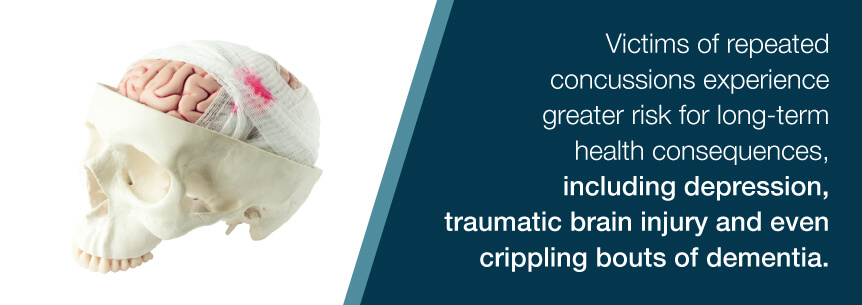
Victims of repeated concussions experience greater risk for long-term health consequences, including depression, traumatic brain injury and even crippling bouts of dementia.
Concussion treatment is very individualized, and physicians determine the course of action on a case-by-case basis. It may require frequent evaluations by a medical team to assess cognitive and physical progress.
While a concussion is a major health issue, it’s one that most often resolves itself. In the immediate aftermath of a patient receiving a concussion, physicians’ primary concerns relate to substantial brain injury, swelling or bleeding in the brain. Your physician may order CT scans or MRIs to rule these issues out.
If you’ve had a pre-participation evaluation to assess your cognitive function, balance and other areas of ability, your doctor may ask you to perform it again for a comparison. Surgery is the likely outcome if these symptoms occur, but it’s unnecessary for most concussions.
Otherwise, physicians often treat concussions with non-aspirin, over-the-counter pain relievers and a series of patient-specific instructions for recovery based on the types and severity of symptoms patients experience. For example, your medical team may initially clear you to return to light aerobic physical activities and non-contact sports.
One new advance for diagnosing concussions is making big news thanks to the Food and Drug Administration’s (FDA) February 14, 2018 approval of the Banyan Brain Trauma Indicator. This first of its kind blood test promises to revolutionize the diagnosis of concussions so that people who display the symptoms can know and seek treatment right way.
The test is significant, as the current techniques for diagnosing concussions rely on a combination of identifying symptoms and CT scan results. However, CNN reports that 90 percent of CT scans are negative for a concussion. The Banyan device does not eliminate the need for CT scans in the diagnostic process, but it can eliminate the use of unnecessary CT scans, saving money and unnecessary exposure to radiation.
Concussion understanding has come a long way over the past century. With new awareness of the potential long-term consequences of concussion, revamped safety in sports receives greater attention than ever before, leading to the prompt identification of concussion symptoms, medical care when warranted and concussion protocols.
Marijuana has shown a lot of promise as a treatment for traumatic brain injury. It has unique properties that could help your brain repair itself following a trauma-related concussion or post-concussion syndrome.
Although there’s not a lot of research on medical marijuana for concussions currently, preclinical findings suggest the herb offers therapeutic benefits to patients after brain injuries. According to some studies, cannabis’s cannabinoids interact with the CB1 and CB2 cannabinoid receptors of your body, which are part of your endocannabinoid system. They protect against neural damage following chronic or acute brain damage.
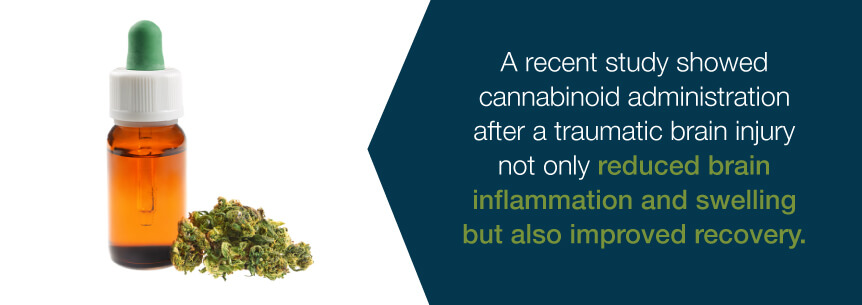
Another study published in the British Journal of Pharmacology showed cannabinoid administration after a traumatic brain injury not only reduced brain inflammation and swelling but also improved recovery.
THC may even increase patient survival rate following a traumatic brain injury. Patients received toxicology screenings from the researchers in a 2014 study published in The American Surgeon journal showing 2.4 percent mortality rates for patients with THC in their system when they were injured, while those without THC in their system had an 11.5 percent mortality rate.
Medical pot for concussions helps treat symptoms such as:
Three primary characteristics that make marijuana a promising treatment for concussions include:
The best marijuana and concussions strains you want to look for are those low in THC with little psychoactive effects. You want enough THC in the strain to provide you with a sense of well-being and reduce your anxiety, but you don’t want to induce paranoia. Some strains to look for include the following.
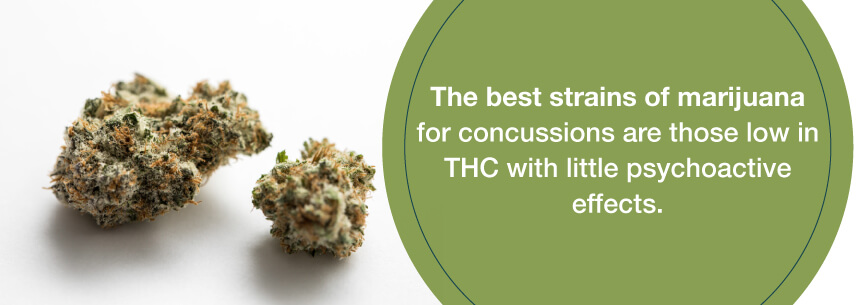
Headache-relieving strains, like:
Strains for anxiety and depression, like:
Strains to help with sleep issues, like:
Strains to combat fatigue, like:
If you need assistance with selecting the right cannabis and concussions strain, you can get help from a qualified marijuana doctor who can recommend the strains for your specific symptoms.
Various methods of medical weed delivery give you different results. Here are the most common methods.
Inhaling
Vaping and smoking are the two most common methods of medical cannabis delivery. You use a vaporizer to vape. This method is 95 percent smoke-free, which is why many users are turning to vaping. With smoking, users use equipment like pipes and bongs, or they roll the herb up into a cannabis cigarette.
Edibles
Edibles can help those who are suffering from nausea and vomiting related to their concussion. This method even helps users get their nutrients and calories with their treatment and is perfect if the strain they’re using causes the “munchies.”
CBD Oil for Concussions
Cannabidiol oils are another option and provide the same effects smoking weed does for concussion symptoms. But CBD oils don’t have THC in them, meaning you get the same healing effects without the psychoactive high.
If you currently don’t know a cannabis doctor, and your primary physician can’t help you, you’ll be happy to learn that you can find one at Marijuana Doctors using the search feature. Here at Marijuana Doctors, we will get you connected with a qualified doctor in your area who can write your recommendation for cannabis for concussions. We’ll answer any questions you have and educate you on the specific regulations regarding using medical marijuana.
Find A Doctor Find A Dispensary